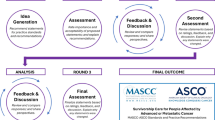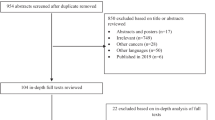Abstract
Purpose
Health literacy (HL) and cancer care coordination (CCC) were examined for their relationship to quality of life (QOL) among breast cancer survivors. CCC was hypothesized to have a stronger relationship to QOL for women with lower HL.
Methods
Women (N = 1138) who had completed treatment for Stage 0–III, ductal carcinoma breast cancer between January 2013 and May 2014 at one of eight large medical centers responded to a mailed questionnaire. Responses to questions about survivorship care planning and presence of professional care coordinator were combined to form an index of CCC. An index of HL was also derived. QOL was measured using the Functional Assessment of Cancer Therapy-Breast (FACT-B) scales.
Results
74.3% (N = 845) of patients reported having a health professional coordinate their care during treatment and 78.8% (N = 897) reported receiving survivorship care planning. CCC was classified as none, partial, or high for 7.1%, 32.7%, and 60.2% of the patients, respectively. Except for emotional well-being, the interaction between HL and CCC was significant for all QOL domains (p < .05); the effect of CCC on FACT-B scores was largest for people with lower HL. For the 39.8% of patients with less than high CCC, 111 (27.3%) had a level of HL associated with clinically meaningful lower QOL.
Conclusions
The association between CCC and later QOL is strongest for people who have lower HL. Prioritizing care coordination for patients with lower health literacy may be an effective strategy in a setting of limited resources.

Similar content being viewed by others
References
McCabe MS, Partridge AH, Grunfeld E, Hudson MM (2013) Risk-based health care, the cancer survivor, the oncologist, and the primary care physician. Semin Oncol. 40(6):804–812. https://doi.org/10.1053/j.seminoncol.2013.09.004
Institute of Medicine (2001) Crossing the quality chasm: a new health system for the 21st century. The National Academies Press, Washington, DC
Beesley VL, Janda M, Burmeister EA, Goldstein D, Gooden H, Merrett ND et al (2017) Association between pancreatic cancer patients’ perception of their care coordination and patient-reported and survival outcomes. Palliat Support Care:1–10. https://doi.org/10.1017/s1478951517000608
Gorin SS, Haggstrom D, Han PKJ, Fairfield KM, Krebs P, Clauser SB (2017) Cancer care coordination: a systematic review and meta-analysis of over 30 years of empirical studies. Ann Behav Med. 51(4):532–546. https://doi.org/10.1007/s12160-017-9876-2
Mullan F (1985) Seasons of survival: reflections of a physician with cancer. N Engl J Med. 313(4):270–273. https://doi.org/10.1056/nejm198507253130421
Committee on Improving the Quality of Cancer Care: Addressing the Challenges of an Aging P, Board on Health Care S, Institute of M (2013) In: Levit L, Balogh E, Nass S, Ganz PA (eds) Delivering high-quality cancer care: charting a new course for a system in crisis. National Academies Press (US), Washington (DC)
Chrischilles EA, McDowell BD, Rubenstein L, Charlton M, Pendergast J, Juarez GY et al (2015) Survivorship care planning and its influence on long-term patient-reported outcomes among colorectal and lung cancer survivors: the CanCORS disease-free survivor follow-up study. J Cancer Surviv. 9(2):269–278. https://doi.org/10.1007/s11764-014-0406-y
Maly RC, Liang LJ, Liu Y, Griggs JJ, Ganz PA (2017) Randomized controlled trial of survivorship care plans among low-income, predominantly Latina breast cancer survivors. J Clin Oncol. 35(16):1814–1821. https://doi.org/10.1200/jco.2016.68.9497
Grunfeld E, Julian JA, Pond G, Maunsell E, Coyle D, Folkes A et al (2011) Evaluating survivorship care plans: results of a randomized, clinical trial of patients with breast cancer. J Clin Oncol. 29(36):4755–4762. https://doi.org/10.1200/JCO.2011.36.8373
Hershman DL, Greenlee H, Awad D, Kalinsky K, Maurer M, Kranwinkel G et al (2013) Randomized controlled trial of a clinic-based survivorship intervention following adjuvant therapy in breast cancer survivors. Breast Cancer Res Treat. 138(3):795–806. https://doi.org/10.1007/s10549-013-2486-1
Brothers BM, Easley A, Salani R, Andersen BL (2013) Do survivorship care plans impact patients' evaluations of care? A randomized evaluation with gynecologic oncology patients. Gynecol Oncol. 129(3):554–558. https://doi.org/10.1016/j.ygyno.2013.02.037
Boekhout AH, Maunsell E, Pond GR, Julian JA, Coyle D, Levine MN et al (2015) A survivorship care plan for breast cancer survivors: extended results of a randomized clinical trial. J Cancer Surviv. 9(4):683–691. https://doi.org/10.1007/s11764-015-0443-1
de Rooij BH, Ezendam NPM, Nicolaije KAH, Caroline Vos M, Pijnenborg JMA, Boll D et al (2017) Effects of Survivorship Care Plans on patient reported outcomes in ovarian cancer during 2-year follow-up - The ROGY care trial. Gynecol Oncol. 145(2):319–328. https://doi.org/10.1016/j.ygyno.2017.02.041
Birken SA, Clary AS, Bernstein S, Bolton J, Tardif-Douglin M, Mayer DK et al (2018) Strategies for successful survivorship care plan implementation: results from a qualitative study. Journal of oncology practice. 14(8):e462–ee83. https://doi.org/10.1200/jop.17.00054
Parry C, Kent EE, Forsythe LP, Alfano CM, Rowland JH (2013) Can’t see the forest for the care plan: a call to revisit the context of care planning. J Clin Oncol. 31(21):2651–2653. https://doi.org/10.1200/JCO.2012.48.4618
Institute of Medicine Committee on Health Literacy (2004) In: Nielsen-Bohlman L, Panzer AM, Kindig DA (eds) Health literacy: a prescription to end confusion. National Academies Press (US), Washington (DC)
Brady MJ, Cella DF, Mo F, Bonomi AE, Tulsky DS, Lloyd SR et al (1997) Reliability and validity of the Functional Assessment of Cancer Therapy-Breast quality-of-life instrument. J Clin Oncol. 15(3):974–986. https://doi.org/10.1200/jco.1997.15.3.974
Chew LD, Bradley KA, Boyko EJ (2004) Brief questions to identify patients with inadequate health literacy. Fam Med. 36(8):588–594
Chew LD, Griffin JM, Partin MR, Noorbaloochi S, Grill JP, Snyder A et al (2008) Validation of screening questions for limited health literacy in a large VA outpatient population. J Gen Intern Med. 23(5):561–566. https://doi.org/10.1007/s11606-008-0520-5
Hewitt M, Greenfield S, Stovall E (2006) From cancer patient to cancer survivor: lost in transition. National Academies Press, Washington, D.C.
White H (1980) A heteroscedasticity-consistent covariance matrix estimator and a direct test for heteroscedasticity. Econometrica. 48:817–838
Eton DT, Cella D, Yost KJ, Yount SE, Peterman AH, Neuberg DS et al (2004) A combination of distribution- and anchor-based approaches determined minimally important differences (MIDs) for four endpoints in a breast cancer scale. J Clin Epidemiol. 57(9):898–910. https://doi.org/10.1016/j.jclinepi.2004.01.012
Amalraj S, Starkweather C, Nguyen C, Naeim A (2009) Health literacy, communication, and treatment decision-making in older cancer patients. Oncology (Williston Park, NY). 23(4):369–375
Berkman ND, Sheridan SL, Donahue KE, Halpern DJ, Crotty K (2011) Low health literacy and health outcomes: an updated systematic review. Ann Intern Med. 155(2):97–107. https://doi.org/10.7326/0003-4819-155-2-201107190-00005
Hawley ST, Janz NK, Lillie SE, Friese CR, Griggs JJ, Graff JJ et al (2010) Perceptions of care coordination in a population-based sample of diverse breast cancer patients. Patient Educ Couns. 81 Suppl:S34–S40. https://doi.org/10.1016/j.pec.2010.08.009
Halverson JL, Martinez-Donate AP, Palta M, Leal T, Lubner S, Walsh MC et al (2015) Health literacy and health-related quality of life among a population-based sample of cancer patients. J Health Commun. 20(11):1320–1329. https://doi.org/10.1080/10810730.2015.1018638
McDonald KM, Sundaram V, Bravata DM, Lewis R, Lin N, Kraft SA et al. AHRQ Technical Reviews. Closing the quality gap: a critical analysis of quality improvement strategies (Vol. 7: Care Coordination). Rockville (MD): Agency for Healthcare Research and Quality (US); 2007.
Cancer program standards: ensuring patient-centered care. Commision on Cancer. https://www.facs.org/~/media/files/quality%20programs/cancer/coc/2016%20coc%20standards%20manual_interactive%20pdf.ashx. Accessed 26 Nov 2018.
Dickens C, Lambert BL, Cromwell T, Piano MR (2013) Nurse overestimation of patients’ health literacy. J Health Commun. 18(Suppl 1):62–69. https://doi.org/10.1080/10810730.2013.825670
Bass PF 3rd, Wilson JF, Griffith CH, Barnett DR (2002) Residents’ ability to identify patients with poor literacy skills. Acad Med. 77(10):1039–1041
Powell CK, Kripalani S (2005) Brief report: resident recognition of low literacy as a risk factor in hospital readmission. J Gen Intern Med. 20(11):1042–1044. https://doi.org/10.1111/j.1525-1497.2005.0220.x
Mora-Pinzon MC, Chrischilles EA, Greenlee RT, Hoeth L, Hampton JM, Smith MA et al (2018) Variation in coordination of care reported by breast cancer patients according to health literacy. Support Care Cancer. https://doi.org/10.1007/s00520-018-4370-3
Acknowledgments
The authors would like to thank Julie McGregor, Amy Godecker, Kathy Peck, and Sarah Esmond for their assistance with data collection and study conduct; the Share Thoughts on Breast Cancer patient advocates who helped develop the study questionnaire including Cheryl Jernigan and Jody Rock; the study site coordinators and project managers who conducted the study mailings including Teresa Bosler, Michele Coady, Mack Dressler, Sarah Esmond, Bret Gardner, Amy Godecker, Brian Gryzlak, Julie McGregor, Deb Multerer, Char Napurski, Kathy Peck, Nick Rudzianski, Sabrina Uppal, Xiao Zhang, and Brittany Zschoche; investigators overseeing data collection including Drs. Anne Berger, Anne Blaes, Elizabeth Chrischilles, Lindsay Cowell, Barbara Haley, Jennifer Klemp, Ingrid Lizarraga, Joan Neuner, Adedayo Onitilo, Amalie Ramirez, and Priyanka Sharma; and the Greater Plains Collaborative informatics team who integrated tumor registry data and selected the study samples including Bhargav Adagarla, Daniel Connolly, Tamara McMahon, Glenn Bushee, Supreet Kathpalia, Jim McClay, Eneida Mendonca, Tom Mish, Susan Morrison, Phillip Reeder, Nicholas Smith, and Laurel Verhagen.
Funding
This work was funded through a Patient-Centered Outcomes Research Institute (PCORI) Award (CDRN-1306-04631) for the development of the national patient-centered clinical research network, known as PCORnet. It was also supported by NIH grants UL1TR002537 for the University of Iowa Institute for Clinical and Translational Science and P30 CA086862 for the Holden Comprehensive Cancer Center (Chrischilles, McDowell, Mott); and NIH grants UL1TR000427 for the University of Wisconsin Institute of Clinical and Translational Research and P30 CA014520 for the University of Wisconsin Carbone Cancer Center (Trentham-Dietz).
Author information
Authors and Affiliations
Corresponding author
Ethics declarations
Conflict of interest
Dr. Klemp founded and owns stock in Cancer Survivorship Training, Inc., and received honoraria from Novartis Oncology, Pfizer Oncology, and Myriad Genetic Laboratories. Ms. Mott received grant support from the Rising Tide Foundation for Clinical Cancer Research. Dr. Otte received travel support from the National Institutes of Health. The remaining authors declare that they have no potential conflict of interest.
Research involving human participants
All procedures performed in studies involving human participants were in accordance with the ethical standards of the institutional and/or national research committee and with the 1964 Helsinki declaration and its later amendments or comparable ethical standards.
Informed consent
By returning the “Share Thoughts on Breast Cancer” survey to the study coordinating center, participants provided their informed consent to participate (as described in the survey instructions).
Disclaimer
The views, statements, and opinions presented in this work are solely the responsibility of the authors and do not necessarily represent the views of PCORI, its board of governors or methodology committee or other participants in PCORnet.
Additional information
Publisher’s note
Springer Nature remains neutral with regard to jurisdictional claims in published maps and institutional affiliations.
Rights and permissions
About this article
Cite this article
McDowell, B.D., Klemp, J., Blaes, A. et al. The association between cancer care coordination and quality of life is stronger for breast cancer patients with lower health literacy: A Greater Plains Collaborative study. Support Care Cancer 28, 887–895 (2020). https://doi.org/10.1007/s00520-019-04894-y
Received:
Accepted:
Published:
Issue Date:
DOI: https://doi.org/10.1007/s00520-019-04894-y




